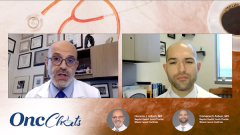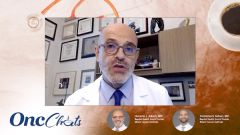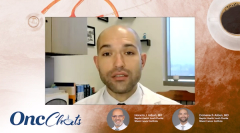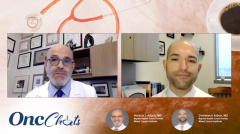
Mapping Progress in Pancreatic Cancer Surgery: Leveraging New Technology
In this last episode of OncChats: Mapping Progress Made in Pancreatic Cancer Surgery, Horacio J. Asbun, MD, and Domenech Asbun, MD, explain how augmented reality or artificial intelligence may be utilized to improve outcomes for patients with pancreatic cancer who are undergoing surgical procedures.
Episodes in this series

In this last episode of OncChats: Mapping Progress Made in Pancreatic Cancer Surgery, Horacio J. Asbun, MD, and Domenech Asbun, MD, explain how augmented reality or artificial intelligence may be utilized to improve outcomes for patients with pancreatic cancer who are undergoing surgical procedures.
HA: But tell me a little bit more. An area that I see we still operate blindly is the liver, right? What do you think is going to happen with augmented reality or artificial intelligence [AI]? Improved imaging reconstruction? Are we going to be planning the surgery before[hand]? Do you see that field evolving quickly? I think, yes, but you have more experience with that. What do you think about that?
DA: I think it is already expanding. As you’re aware, 3D reconstructions of anatomy are already commonplace in places that do high-volume liver surgery. The ability to use those 3D reconstructions for surgical planning is moving far beyond just looking at a CT scan or an MRI, and helping surgeons understand how to access the tumor, what vessels to look out for, etc
And yeah, you’re completely right. I think the 2 biggest areas in which we will see these changes is in augmented reality—so, the ability for the surgeon to superimpose previously obtained anatomical images on the surgical field, which will help with identifying some of these infrastructures—as well as the role of AI. Now, this is very early field, and it will take a long time for the technology to get [the job done] well enough that it will actually be helpful, but there’s a big interest in seeing how a surgeon’s perspective can be supplemented by AI feedback during the operation of certain structures, certain anatomical situations, etc. That might make the surgeon’s life a little bit easier in these inherently very complex operations.
HA: It’s exciting; no question about it. I think that the changes we have witnessed over the past decades, and what we’re witnessing now, is all very exciting. We are fortunate to be surgeons. We’re fortunate to be able to help patients in the way that we do, and I feel so much more pleasure interacting with our colleagues now, in oncology, interventional radiology, gastroenterology, interventional gastroenterology, etc., because it feels that we are a real team treating patients. I think that you have been able to experience that, [too]. It’s fantastic to work together.
I don’t know whether you want to make any closing comments, but I think that we have [covered quite a bit]. I don’t want to bore anyone; I know for a fact that you and I can continue talking about all of this for several hours. I think we will need to stop at some point.
DA: I think we’ll stop. I’ll just echo your comments that it’s an exciting time to be a surgeon. It’s going to be somewhat crazy to look back at this conversation 5 to 10 years [from now] and see how far we’ve come, but I’m very happy to have the best job in the world and to share it with you.
HA: Same here. Thank you very much to OncLive for hosting us on [this] OncChats [series]. We’re very appreciative of the opportunity.









































